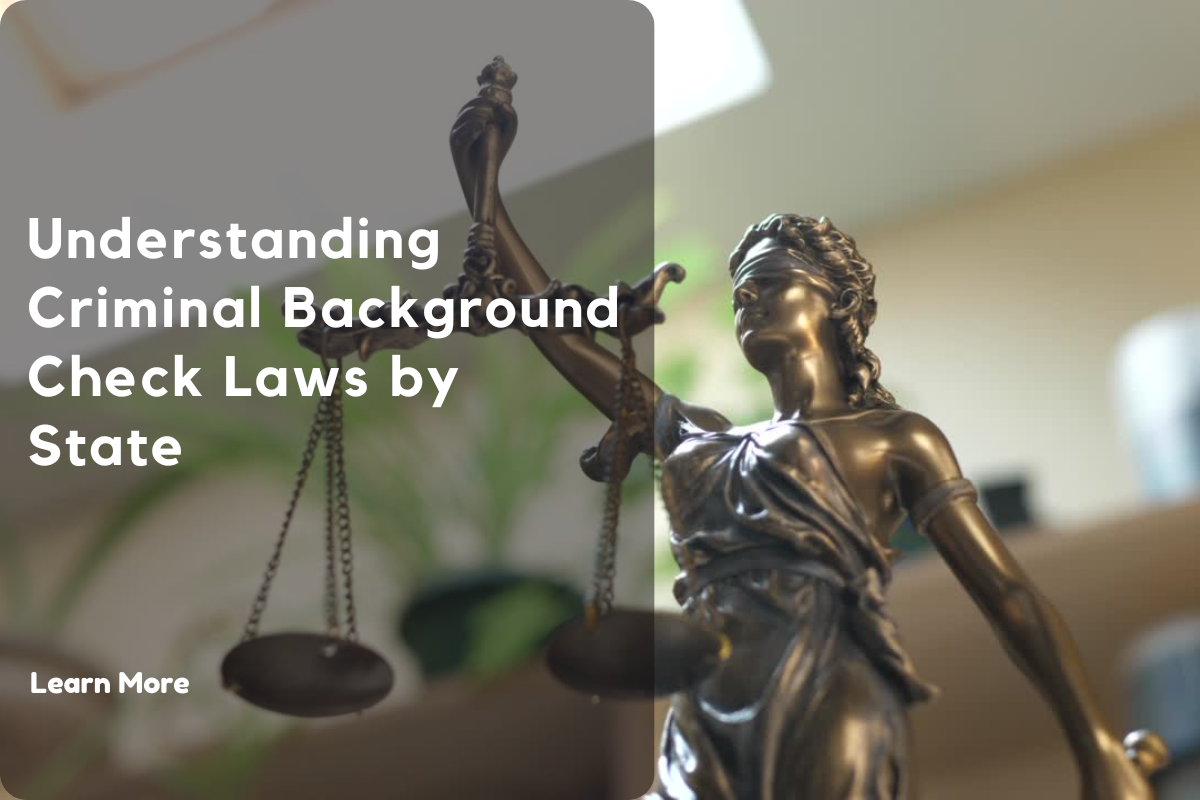 Introduction to Criminal Background Check Laws by State
Introduction to Criminal Background Check Laws by State
Criminal background check laws in the United States are far from uniform. They vary significantly from state to state, creating a complex landscape for employers, job seekers, and individuals trying to understand how criminal records affect employment decisions. These laws are shaped by a variety of factors, such as state-specific legislation, the Fair Credit Reporting Act (FCRA), local ordinances, and more. While background checks are a common part of the hiring process, understanding the nuances of these laws is essential for employers to remain compliant and ensure fair treatment of applicants.
Why Do Criminal Background Check Laws Vary by State?
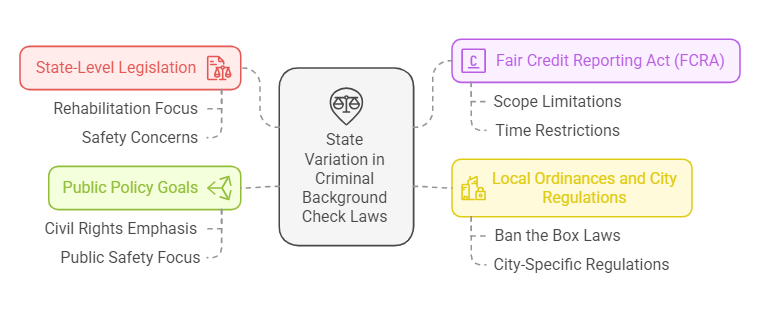
The variation in criminal background check laws arises from several factors, including differing priorities, local legal frameworks, and historical contexts. States are given the flexibility to regulate the use of criminal history information in their own way. This results in a diverse set of rules regarding what can be used in hiring decisions, when a background check can be conducted, and what types of offenses are considered. Below are some key reasons why these laws differ by state:
- State-Level Legislation: States have the authority to pass their own laws regulating criminal background checks. Each state has its unique approach to criminal justice and public safety, influencing how criminal history is used in hiring decisions. For example, a state with a high priority on rehabilitation may be more lenient about criminal convictions in employment, while others may prioritize safety and risk management.
- Fair Credit Reporting Act (FCRA): The FCRA is a federal law that regulates the use of consumer reports, including criminal background checks, by employers. However, while the FCRA establishes the rules for how background checks must be conducted, states have the ability to create more restrictive laws. These state laws may limit the scope of what can be reported or how it can be used in employment decisions. For instance, some states impose time limits on when criminal offenses can be considered, while others prohibit employers from considering minor offenses.
- Local Ordinances and City Regulations: In addition to state laws, many cities and counties have enacted their own ordinances or regulations related to criminal background checks. These local laws can vary from the state’s laws, leading to even more complexity. For example, some municipalities have adopted “ban the box” laws, which prevent employers from asking about an applicant’s criminal history on job applications, while state law may not have such restrictions.
- Public Policy Goals: The varying approaches to criminal background check laws are often influenced by a state’s public policy objectives. Some states emphasize protecting the civil rights of individuals with criminal histories, especially in areas where rehabilitation and reintegration into society are prioritized. Other states may focus more heavily on public safety concerns and consider a broader range of offenses in employment decisions.
The Role of Criminal Background Checks in Hiring
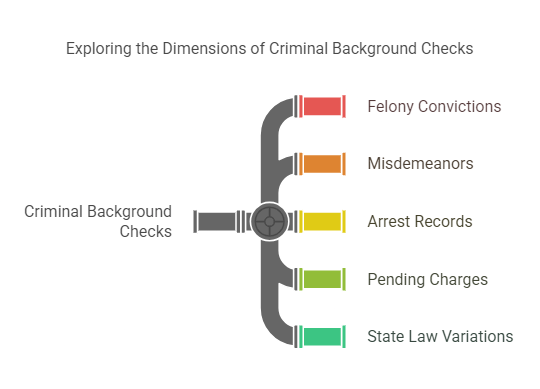
Employers across the country use criminal background checks as part of their hiring process to ensure they are selecting candidates who are trustworthy, responsible, and fit for the job. Background checks help employers assess the risk of hiring someone with a criminal record, especially in positions that require high levels of trust, security, or safety.
Criminal background checks typically involve reviewing an applicant’s criminal history, including any convictions or arrests, as well as any pending charges. The information gathered can include:
- Felony convictions
- Misdemeanors
- Arrest records
- Pending criminal charges
- History of violent crimes, drug offenses, or theft
Employers typically use these checks to determine whether a candidate’s past actions may pose a risk to the workplace or customers. However, the laws surrounding how this information can be used vary widely. Some states limit how far back a criminal background check can go, while others allow employers to consider a wider range of offenses. In some states, employers must consider the nature of the crime in relation to the job position being offered, while other states allow more discretion.
Factors That Influence Criminal Background Check Laws by State
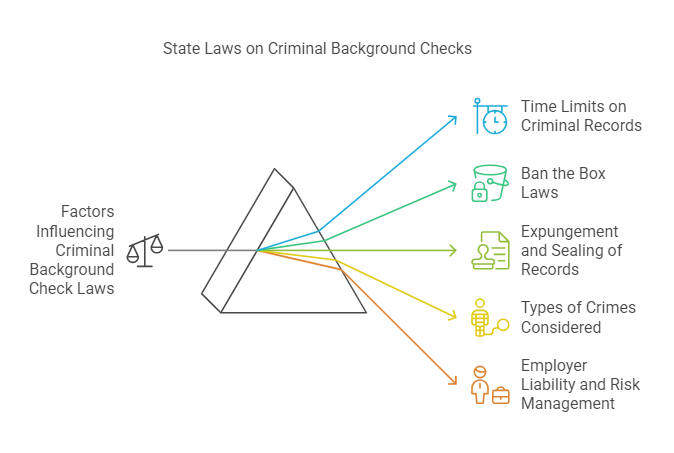
Several factors play a role in determining how criminal background check laws are structured in each state. These include the state’s approach to public safety, the rights of individuals with criminal records, and the need for employers to maintain safe and secure workplaces. Below are some of the most important elements that influence these laws:
- Time Limits on Criminal Records: One significant factor in state laws is how long criminal records can be considered by employers. Many states have enacted laws that limit how far back employers can look into a candidate’s criminal history. Typically, these time limits apply to misdemeanor convictions or arrests that did not lead to a conviction. States like California, New York, and Michigan often impose a 7-year limit on background checks for most types of criminal offenses, though felonies may be excluded from these time limits.
- Ban the Box Laws: “Ban the Box” laws are state and local regulations that prevent employers from asking about an applicant’s criminal history early in the hiring process. These laws are designed to give individuals with criminal records a better chance at employment, ensuring that they are considered based on their qualifications rather than their criminal history. Over 30 states and numerous cities have passed some form of “ban the box” legislation, though the specifics vary. Some states require that the question about criminal history only be asked after a conditional offer has been made.
- Expungement and Sealing of Criminal Records: Some states offer processes that allow individuals to expunge or seal their criminal records after a certain period. Expungement removes the conviction from an individual’s criminal history, while sealing restricts access to the record, but it may still be available under certain circumstances. States like California, New York, and Illinois have robust expungement laws, while others, like Texas and Florida, have more restrictive criteria.
- Types of Crimes Considered: States also differ in which types of criminal offenses employers can consider when making employment decisions. In some states, employers are restricted to considering only serious crimes, such as violent offenses or drug trafficking, while in others, a broader range of crimes, including non-violent offenses like theft or fraud, may be considered. For example, in Texas, employers may consider both Class A and Class B misdemeanors, whereas in California, only felony convictions may have a significant impact on employment decisions.
- Employer Liability and Risk Management: In some states, employers face potential liability if they hire someone with a criminal background that could pose a risk to others. In these states, employers may be required to consider the nature of the crime and its relevance to the job duties. For example, a violent felony conviction may disqualify an applicant for a position that involves working with children or vulnerable populations. In contrast, an employer in another state may have more discretion in hiring someone with a criminal record, depending on the circumstances.
Table: Overview of Criminal Background Check Laws by State
| State | Use in Hiring | Types of Crimes Considered | Time Limits | Expungement Options | Ban the Box |
|---|---|---|---|---|---|
| California | Limited, but criminal history may be considered | Felonies, misdemeanors | Typically 7 years | Yes, for certain crimes | Yes |
| New York | Limited, must be job-related | Felonies, serious misdemeanors | 7 years | Yes, for certain crimes | Yes |
| Texas | May consider for some positions | Felonies, Class A & B misdemeanors | 7 years for most crimes | Limited expungement options | No |
| Florida | Can be used for certain positions | Felonies, serious misdemeanors | 7 years | Yes, for some offenses | No |
| Ohio | Limited in certain fields | Felonies, serious misdemeanors | Varies by offense type | Yes, for certain crimes | No |
| Michigan | Limited use, must be job-related | Felonies, misdemeanors | 7 years | Yes, for some offenses | Yes |
Criminal background check laws by state are critical for employers to understand in order to comply with legal requirements and promote fair hiring practices. These laws are influenced by a mix of state-level regulations, local ordinances, and federal mandates, creating a complex environment for employers to navigate. Understanding these laws is vital for maintaining compliance, avoiding legal risks, and ensuring equal opportunities for all applicants.
A Breakdown of Criminal Background Check Laws in Key States
we explored the factors influencing criminal background check laws across the United States. Now, let’s dive deeper into how these laws are applied in practice across different states. We’ll examine criminal background check regulations in key states, such as California, New York, Texas, Florida, and others, to understand the variations in how criminal history is considered during the hiring process. At the end of this section, we’ll provide a list of all 50 states and their basic approach to criminal background checks.
California: A Progressive Approach to Criminal Background Checks
California is one of the most progressive states when it comes to criminal background checks, particularly regarding fairness and opportunities for rehabilitation. California’s laws are designed to protect individuals with criminal records from discrimination while still allowing employers to assess risks to the workplace.
- Use in Hiring: California’s “Ban the Box” law prevents employers from asking about criminal history on job applications. Employers can only inquire about criminal history after a conditional offer has been made, giving applicants a fair chance before their criminal record is considered.
- Types of Crimes Considered: California employers can consider felony convictions and serious misdemeanors that are relevant to the job. For example, an employer hiring for a financial position might take a theft conviction into account, while a non-violent misdemeanor might not be deemed relevant for most jobs.
- Time Limits: California imposes a 7-year time limit for considering misdemeanor convictions in most cases. Felony convictions, however, can be considered indefinitely, particularly if the offense is deemed relevant to the job.
- Expungement: California offers expungement for certain criminal offenses, allowing individuals to have their records sealed and removed from the public eye. This can significantly reduce the impact of a criminal record on future job opportunities.
- Impact on Employers: Employers in California are required to follow strict rules when using criminal background checks. If an employer decides to deny a job based on criminal history, they must provide the applicant with an opportunity to challenge or explain the decision.
New York: Striking a Balance Between Safety and Rehabilitation
New York is another state that has implemented progressive laws to ensure fairness in the hiring process while maintaining public safety. The state aims to offer second chances to those with criminal records, but employers must also consider relevant criminal history when making decisions.
- Use in Hiring: New York’s “Ban the Box” law prohibits employers from asking about criminal convictions on initial job applications. Employers can only inquire after the interview process or when they are ready to make a conditional job offer. This gives individuals with criminal records a fair chance at being considered for the position.
- Types of Crimes Considered: Employers in New York can consider felony convictions and certain serious misdemeanors, particularly if the conviction is relevant to the duties of the job. For example, a conviction for embezzlement would likely be considered for a financial position but may not be relevant for a retail position.
- Time Limits: Like California, New York has a 7-year limit on considering misdemeanor convictions. However, felony convictions may be considered indefinitely, depending on their relevance to the job.
- Expungement: New York allows for the sealing of certain criminal records, which restricts access to them by employers. However, expungement is more limited in New York than in other states, and not all offenses qualify for this benefit.
- Impact on Employers: Employers must carefully evaluate criminal records to ensure they are relevant to the job. New York’s laws aim to prevent discrimination based on irrelevant criminal history while allowing employers to make informed decisions based on the applicant’s qualifications and the nature of the crime.
Texas: A Stricter Approach Focused on Public Safety
Texas takes a tougher stance on criminal background checks, with an emphasis on public safety and risk management. The state allows employers to consider a wide range of criminal convictions when making hiring decisions.
- Use in Hiring: Employers in Texas can ask about an applicant’s criminal history during the hiring process and are not restricted by “Ban the Box” laws. However, they must still follow federal regulations under the Fair Credit Reporting Act (FCRA).
- Types of Crimes Considered: Texas employers can consider felony convictions, misdemeanors, and even Class A and B misdemeanors when making decisions. Employers are allowed significant discretion in determining which criminal offenses are relevant to a job position.
- Time Limits: Texas has no state-imposed time limits on how far back an employer can look when conducting a background check. Criminal history can be considered indefinitely, which gives employers more flexibility, but also places the responsibility on them to ensure fairness and relevance.
- Expungement: Expungement options in Texas are more limited compared to states like California and New York. Only certain minor offenses can be sealed, while more serious crimes, particularly felonies, are much harder to expunge.
- Impact on Employers: Employers in Texas have more latitude in considering an applicant’s criminal background. However, they should be careful when making decisions based solely on criminal history to avoid discrimination lawsuits or violations of federal laws like the FCRA.
Florida: A Focus on Safety and Security
Florida’s criminal background check laws reflect the state’s priority on public safety and the protection of vulnerable populations. Employers in Florida can use criminal background checks to assess whether an applicant poses a risk to the workplace or others.
- Use in Hiring: Florida employers can use criminal background checks during the hiring process. While there is no statewide “Ban the Box” law, employers in certain industries (such as healthcare) may be prohibited from hiring individuals with certain criminal records.
- Types of Crimes Considered: Employers in Florida may consider felonies and certain misdemeanors, particularly when the offenses relate to the job. Violent crimes such as assault, battery, and robbery are typically considered more serious than non-violent crimes like theft.
- Time Limits: Florida imposes a 7-year limit for considering most criminal convictions, but certain serious crimes may be considered indefinitely, especially when relevant to the job.
- Expungement: Florida allows the sealing of some criminal records, but the expungement process is not as straightforward as in other states. Expungement is often available for minor offenses, but felonies typically cannot be expunged.
- Impact on Employers: Employers must be diligent when reviewing criminal records in Florida, especially in industries like healthcare or law enforcement, where there may be specific regulations governing the use of criminal history in hiring decisions.
List of All 50 States and Their Criminal Background Check Laws
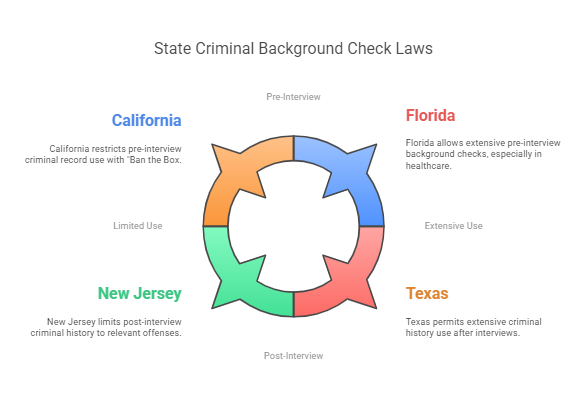
While the specific details of criminal background check laws vary widely across the 50 states, here’s a list summarizing the general approach of each state:
- Alabama – Employers may consider criminal history, with no specific time limits.
- Alaska – Employers can review criminal history, but some records may be sealed.
- Arizona – No time limits for criminal background checks, but certain offenses may be expunged.
- Arkansas – Employers can consider most criminal records.
- California – Limited use of criminal records; “Ban the Box” and expungement laws in place.
- Colorado – Background checks may be used, with certain restrictions for minor offenses.
- Connecticut – “Ban the Box” law; criminal history considered after the first interview.
- Delaware – Employers may use criminal records, with some expungement options.
- Florida – Background checks allowed, especially in sensitive sectors like healthcare.
- Georgia – Employers may use criminal history, no state-imposed time limits.
- Hawaii – “Ban the Box” law; limited use of criminal records.
- Idaho – Employers may use criminal history in hiring decisions.
- Illinois – “Ban the Box” law; criminal records may be sealed.
- Indiana – Employers may use criminal records for most positions.
- Iowa – No state restrictions; employers may consider most criminal history.
- Kansas – Employers may consider criminal history; no state-imposed time limits.
- Kentucky – Employers may consider felony and misdemeanor convictions.
- Louisiana – Employers may use criminal history, but expungement options available.
- Maine – “Ban the Box” law; employers may use criminal history after initial screening.
- Maryland – “Ban the Box”; background checks may only be used after an interview.
- Massachusetts – “Ban the Box”; criminal history may be considered based on relevance.
- Michigan – Employers may use criminal history but must ensure job relevance.
- Minnesota – “Ban the Box”; limited criminal history usage.
- Mississippi – Employers can use criminal records in hiring decisions.
- Missouri – Employers can consider criminal history without specific restrictions.
- Montana – Employers may consider criminal records, but no time limits.
- Nebraska – Employers may use criminal history, but some records may be sealed.
- Nevada – Employers may consider criminal history, with some expungement options.
- New Hampshire – “Ban the Box”; criminal records used after job offer.
- New Jersey – “Ban the Box”; criminal history considered only for relevant offenses.
- New Mexico – Employers can use criminal history but must follow “Ban the Box.”
- New York – “Ban the Box”; criminal history considered only after interview.
- North Carolina – Employers may use criminal records but must assess job relevance.
- North Dakota – Employers can consider criminal history, but there are expungement options.
- Ohio – Employers may use criminal history, no state-imposed time limits.
- Oklahoma – Employers may consider criminal records, with some expungement options.
- Oregon – “Ban the Box”; limited use of criminal history.
- Pennsylvania – “Ban the Box”; criminal history can only be used after interview.
- Rhode Island – Employers may consider criminal history, especially in sensitive sectors.
- South Carolina – Employers can consider criminal history, with no time limits.
- South Dakota – Employers may use criminal records in hiring decisions.
- Tennessee – Employers may consider criminal history, with some expungement options.
- Texas – No time limits; employers may use criminal records in hiring decisions.
- Utah – Employers can use criminal history in hiring decisions.
- Vermont – “Ban the Box”; employers may consider criminal history after job interview.
- Virginia – Employers may use criminal history, but “Ban the Box” law applies.
- Washington – “Ban the Box”; criminal records may be sealed or expunged.
- West Virginia – Employers may consider criminal history without state-imposed time limits.
- Wisconsin – Employers may use criminal history but must follow state regulations.
- Wyoming – Employers may consider criminal records, with no state-imposed time limits.
Legal Aspects of Criminal Background Checks
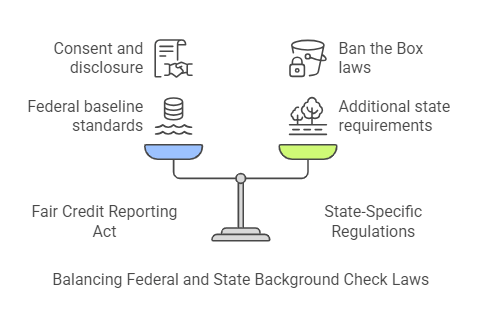
The Fair Credit Reporting Act (FCRA)
The Fair Credit Reporting Act (FCRA) is a federal law that regulates how background checks are conducted and how criminal records are reported. While states have their own specific regulations regarding criminal background checks, the FCRA sets forth the baseline standards for compliance. Here’s how the FCRA influences state laws:
- Consent Requirement: Employers must obtain written consent from the applicant before conducting a criminal background check. This consent is essential for legal compliance under both federal and state laws.
- Disclosure of Negative Information: If an employer decides not to hire an individual based on the results of a criminal background check, they must provide the applicant with a copy of the report, along with a notice of their rights under the FCRA. This gives individuals the opportunity to dispute any inaccuracies before the final decision is made.
- Accuracy and Relevance: Employers are required to ensure that the criminal background information they use is accurate and relevant to the position for which the individual is applying. This ensures that applicants are not unfairly discriminated against due to outdated or irrelevant criminal history.
- Timing of Criminal Record Use: The FCRA mandates that criminal background checks should be used only after a conditional offer has been made, except in cases where the employer is required by law to conduct a check before making an offer.
State-Specific Regulations and the FCRA
While the FCRA provides the overarching legal framework, state-specific laws often go beyond the federal requirements. For example, many states have enacted “Ban the Box” laws, which restrict employers from asking about criminal convictions on job applications. Other states provide more stringent guidelines on how far back an employer can look into an applicant’s criminal history. It’s essential for employers to be familiar with both federal and state regulations to ensure full compliance and avoid potential legal pitfalls.
Frequently Asked Questions (FAQs)
What is the process for conducting a criminal background check in different states?
The process for conducting a criminal background check generally involves obtaining written consent from the applicant, conducting the check through an authorized background screening agency, and reviewing the results. However, state laws may differ on when an employer can request this information (e.g., after a job offer is made or during the initial application process), what types of offenses are reportable, and how the information can be used.
Can an employer deny employment based on a criminal record?
Yes, employers can deny employment based on a criminal record, but only if the offense is relevant to the job position and if they comply with both federal and state laws. The FCRA requires employers to give applicants the opportunity to explain or dispute the findings, and many states have additional rules governing what types of offenses can be considered and how long ago they occurred.
How does expungement affect criminal background checks?
Expungement refers to the legal process of sealing or erasing a criminal record. Once an individual’s record is expunged, it generally should not appear on a criminal background check. However, not all offenses are eligible for expungement, and the rules vary by state. Employers are prohibited from considering expunged records when making hiring decisions in most states.
What states have "Ban the Box" laws for criminal background checks?
As of now, over 30 states, along with numerous cities and counties, have implemented "Ban the Box" laws that prohibit employers from asking about an applicant’s criminal history on initial job applications. These laws typically require employers to wait until later in the hiring process—after the first interview or conditional job offer—before conducting a criminal background check. States with these laws include California, New York, and Illinois.
What should employers know about state-specific regulations regarding criminal background checks?
Employers should be aware that state laws regarding criminal background checks vary significantly, and failure to comply with these laws can lead to legal challenges. Some states have specific guidelines about the types of offenses employers can consider, while others limit how far back employers can search an applicant’s criminal history. Employers must familiarize themselves with both federal regulations (such as the FCRA) and state-specific requirements to ensure they are not violating any laws.
Conclusion
Understanding and adhering to criminal background check laws is a critical aspect of employment screening. The differences in state laws mean that employers must be diligent in navigating these regulations to ensure they are not inadvertently violating a candidate’s rights or making discriminatory hiring decisions. By complying with both federal laws, such as the FCRA, and state-specific requirements, employers can make informed hiring decisions while respecting applicants’ rights.
In addition, using services like Rapid Hire Solutions can be invaluable in ensuring compliance with criminal background check laws across different states. These solutions can help streamline the background check process, provide guidance on state-specific regulations, and reduce the risk of legal challenges.
By following proper employment screening practices and staying informed about the laws in each state, employers can foster a fairer hiring process while safeguarding their organization from potential risks.
The key takeaways from this article are:
- FCRA Compliance: Ensure that background checks are conducted with the applicant’s consent and in compliance with federal guidelines.
- State-Specific Laws: Be aware of state-specific regulations, such as “Ban the Box” and expungement rules, to avoid legal pitfalls.
- Relevance and Fairness: Always ensure that the criminal history considered is relevant to the job position and adheres to the guidelines set forth by state laws.
- Utilize Background Screening Solutions: Companies like Rapid Hire Solutions can help employers navigate state-specific laws and ensure compliance.
Employers who are diligent in following these laws will not only protect themselves legally but also contribute to a more equitable and fair hiring process.
